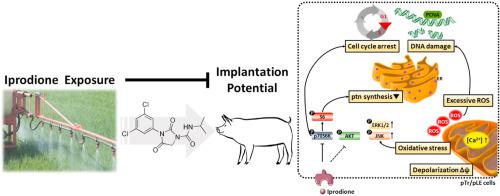Chemosphere ( IF 8.1 ) Pub Date : 2022-08-01 , DOI: 10.1016/j.chemosphere.2022.135894 Wonhyoung Park 1 , Garam An 1 , Whasun Lim 2 , Gwonhwa Song 1

|
Iprodione is a well-known fungicide used in the cultivation of strawberries, tomatoes, grapes, and green beans. In recent studies, neurotoxicity, cardiotoxicity, and endocrine toxicity of iprodione have been reported. Although reproductive toxicity of iprodione has been identified in animal studies, its effects are limited to male fertility. Also, the toxic effects of iprodione on pregnancy, especially the implantation process, have not been elucidated. This study demonstrated a series of cytotoxic responses of iprodione along with the alteration of implantation-related gene expression in porcine trophectoderm (pTr) and luminal epithelium (pLE) cells. In this study, iprodione suppressed cell viability, proliferation, and migration of these cells. Iprodione induced G1 phase arrest and attenuated spheroid formation by pTr and pLE cells. Furthermore, iprodione caused mitochondrial dysfunction and excessive reactive oxygen species generation, which resulted in an increase in mitochondrial calcium levels. Consequently, DNA damage and apoptotic cell death were induced by iprodione treatment in pTr and pLE cells. This stress-induced cell death was mediated by alterations in intracellular signal transduction, including the PI3K/AKT and MAPK signaling pathways. This finding suggests the potential of iprodione to impair the implantation capacity by exerting cytotoxic effects on fetal and maternal cells.
中文翻译:

暴露于异丙二酮可诱导猪滋养外胚层和子宫腔上皮细胞产生 ROS 和线粒体功能障碍,导致妊娠早期植入缺陷
Iprodione 是一种众所周知的杀菌剂,用于草莓、西红柿、葡萄和青豆的种植。在最近的研究中,已经报道了异菌灵的神经毒性、心脏毒性和内分泌毒性。尽管已在动物研究中发现异菌灵的生殖毒性,但其影响仅限于男性生育能力。此外,异菌灵对妊娠的毒性作用,尤其是植入过程,尚未阐明。这项研究证明了异菌脲的一系列细胞毒性反应以及猪滋养外胚层 (pTr) 和管腔上皮 (pLE) 细胞中植入相关基因表达的改变。在这项研究中,异菌脲抑制了这些细胞的细胞活力、增殖和迁移。Iprodione 诱导 G1 期阻滞并减弱 pTr 和 pLE 细胞的球状体形成。此外,iprodione 引起线粒体功能障碍和过量的活性氧生成,从而导致线粒体钙水平升高。因此,在 pTr 和 pLE 细胞中,异丙二酮处理诱导了 DNA 损伤和凋亡细胞死亡。这种应激诱导的细胞死亡是由细胞内信号转导的改变介导的,包括 PI3K/AKT 和 MAPK 信号通路。这一发现表明异菌灵可能通过对胎儿和母体细胞产生细胞毒性作用来损害植入能力。这种应激诱导的细胞死亡是由细胞内信号转导的改变介导的,包括 PI3K/AKT 和 MAPK 信号通路。这一发现表明异菌灵可能通过对胎儿和母体细胞产生细胞毒性作用来损害植入能力。这种应激诱导的细胞死亡是由细胞内信号转导的改变介导的,包括 PI3K/AKT 和 MAPK 信号通路。这一发现表明异菌灵可能通过对胎儿和母体细胞产生细胞毒性作用来损害植入能力。








































 京公网安备 11010802027423号
京公网安备 11010802027423号